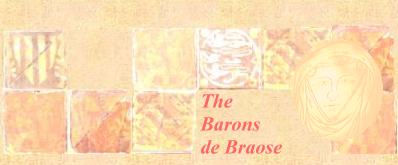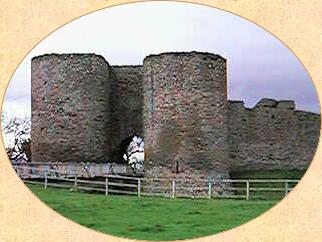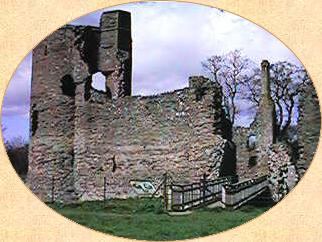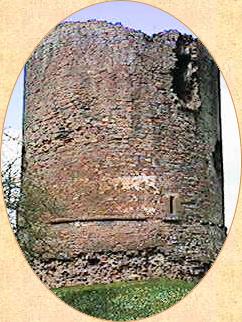
Serving
the King
 William
de Braose passed many responsibilities in Wales and Bramber to
his heir, also William, as early as 1198 but was still an immensely
powerful man. He was Sheriff of Hereford under King Richard from
1192 to 1199. Although not in the Holy Land with his sovereign,
William's son Reginald appears on the Acre Roll as a crusader.
William himself fought alongside Richard the Lion Heart in 1195.
He was also at Chalus in 1199 when Richard received his fatal
arrow wound. On his death bed Richard agreed to appoint Giles
de Braose as Bishop of Hereford. This added a new dimension to
the family's formidable power, including yet another castle,
Bishop's Castle in southern Shropshire.
William
de Braose passed many responsibilities in Wales and Bramber to
his heir, also William, as early as 1198 but was still an immensely
powerful man. He was Sheriff of Hereford under King Richard from
1192 to 1199. Although not in the Holy Land with his sovereign,
William's son Reginald appears on the Acre Roll as a crusader.
William himself fought alongside Richard the Lion Heart in 1195.
He was also at Chalus in 1199 when Richard received his fatal
arrow wound. On his death bed Richard agreed to appoint Giles
de Braose as Bishop of Hereford. This added a new dimension to
the family's formidable power, including yet another castle,
Bishop's Castle in southern Shropshire.
At this time, we have a
glimpse of how William might have appeared to his contemporaries:
courageous, ambitious, astute and politically sophisticated.
He was first to reach John with the news of Richard's death and
was instrumental in securing John's succession. The new king
entered England to attend his coronation via the de Braose port
of Shoreham. William was soon granted all the lands he could
conquer from any Welsh enemies of the crown to extend his honour
of Radnor.
William then accompanied
King John to fight in Normandy. On August 1, 1202 William de
Braose captured John's sixteen year old nephew Arthur, Duke of
Brittany. Arthur was besieging John's mother, Eleanor of
Aquitaine, at Mirebeau. The young duke had allied with King Philip
of France to contest John's succession and represented a very
dire threat. John was elated at the victory.
 William
de Braose guarded his valuable captive at the castle of Falaise.
The King's Chamberlain, Hubert de Burgh, also stayed at Falaise
as Arthur's custodian. King John sent three men with orders to
castrate and blind his young rival but Arthur escaped this mutilation
thanks to the compassion of his jailers. They dismissed John's
men and put about a false story that the prisoner had died.
William
de Braose guarded his valuable captive at the castle of Falaise.
The King's Chamberlain, Hubert de Burgh, also stayed at Falaise
as Arthur's custodian. King John sent three men with orders to
castrate and blind his young rival but Arthur escaped this mutilation
thanks to the compassion of his jailers. They dismissed John's
men and put about a false story that the prisoner had died.
Arthur was moved to Rouen.
Shortly afterwards William de Braose announced to the King and
his barons that he was relinquishing the guardianship of Arthur.
A French chronicle by Guillaume le Breton quotes William de Braose's
words: "I know not what fate awaits your nephew, whose faithful
guardian I have been. I return him to your hands in good health
and sound in all his members. Put him, I pray you, in some other,
happier custody. The burden of my own affairs bids me resign."
Before long Arthur had
disappeared, outraging those who suspected his wicked uncle John.
Some held William de Braose personally responsible. Others said
he received the King's bribes to keep silent and his greed degenerated
to blackmail. Suspicion focused on July 1203, when William received
custody of the city of Limerick. (That year he also gained Kington
in Herefordshire.) Two years before Arthur's death, William had
already obtained North Munster in Ireland, possibly at the death
of his uncle Philip to whom Henry II had first granted it .
John demanded huge fees for these lands, but William probably
never intended to pay.
 In October
1202 John granted William the custody of Glamorgan and four months
later he received Gower. The King wrote off several old
de Braose debts and a lengthy family dispute was concluded in
William's favour when he gained Totnes. In 1206 the de Braoses'
power increased still further. William received the "three
castles", Whitecastle, Grosmont
and Skenfrith, but again for a high fee. The
King also re-appointed him Sheriff of Hereford and a justice
itinerant of Gloucester. William de Braose had become the most
powerful magnate in the country. (11.1)
In October
1202 John granted William the custody of Glamorgan and four months
later he received Gower. The King wrote off several old
de Braose debts and a lengthy family dispute was concluded in
William's favour when he gained Totnes. In 1206 the de Braoses'
power increased still further. William received the "three
castles", Whitecastle, Grosmont
and Skenfrith, but again for a high fee. The
King also re-appointed him Sheriff of Hereford and a justice
itinerant of Gloucester. William de Braose had become the most
powerful magnate in the country. (11.1)
King John's troubles multiplied
when he lost Normandy and other continental domains to France.
In 1207 the Pope imposed Stephen Langton as Archbishop of Canterbury
and John's resistance provoked a papal interdict on England.
The people suffered the distress of being unable to bury their
dead, receive mass or confess their sins. Many nobles, the Archbishop
and several prominent churchmen, including Giles de Braose, Bishop
of Hereford, fled to France where King Philip encouraged the
exiles in their intrigues against John.

back to text

back to text

back to text
 Serving the King |
||||||
At this time, we have a glimpse of how William might have appeared to his contemporaries: courageous, ambitious, astute and politically sophisticated. He was first to reach John with the news of Richard's death and was instrumental in securing John's succession. The new king entered England to attend his coronation via the de Braose port of Shoreham. William was soon granted all the lands he could conquer from any Welsh enemies of the crown to extend his honour of Radnor. William then accompanied King John to fight in Normandy. On August 1, 1202 William de Braose captured John's sixteen year old nephew Arthur, Duke of Brittany. Arthur was besieging John's mother, Eleanor of Aquitaine, at Mirebeau. The young duke had allied with King Philip of France to contest John's succession and represented a very dire threat. John was elated at the victory.
Arthur was moved to Rouen. Shortly afterwards William de Braose announced to the King and his barons that he was relinquishing the guardianship of Arthur. A French chronicle by Guillaume le Breton quotes William de Braose's words: "I know not what fate awaits your nephew, whose faithful guardian I have been. I return him to your hands in good health and sound in all his members. Put him, I pray you, in some other, happier custody. The burden of my own affairs bids me resign." Before long Arthur had disappeared, outraging those who suspected his wicked uncle John. Some held William de Braose personally responsible. Others said he received the King's bribes to keep silent and his greed degenerated to blackmail. Suspicion focused on July 1203, when William received custody of the city of Limerick. (That year he also gained Kington in Herefordshire.) Two years before Arthur's death, William had already obtained North Munster in Ireland, possibly at the death of his uncle Philip to whom Henry II had first granted it . John demanded huge fees for these lands, but William probably never intended to pay.
King John's troubles multiplied
when he lost Normandy and other continental domains to France.
In 1207 the Pope imposed Stephen Langton as Archbishop of Canterbury
and John's resistance provoked a papal interdict on England.
The people suffered the distress of being unable to bury their
dead, receive mass or confess their sins. Many nobles, the Archbishop
and several prominent churchmen, including Giles de Braose, Bishop
of Hereford, fled to France where King Philip encouraged the
exiles in their intrigues against John.
|
||||||